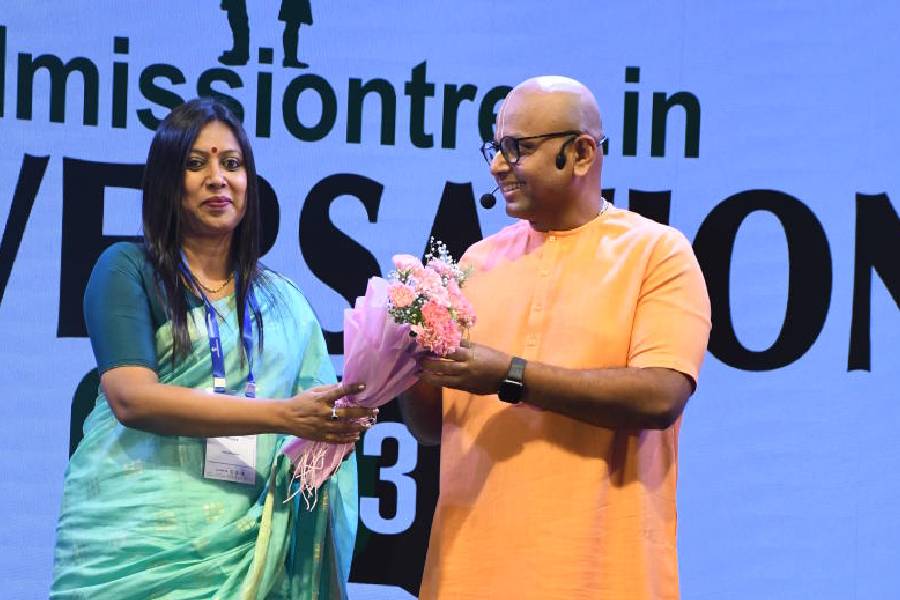Monk, author, life coach and motivational speaker Gaur Gopal Das focused on embracing life and letting its experiences help children gain knowledge so they develop into responsible adults and good human beings. A select crowd comprising the cream of the city’s education fraternity and intelligentsia heard him deliver his words of wisdom as part of his keynote address at SIP Abacus presents admissiontree.in Conversations 2023, partnered by Narayana Group of Schools, an ABP initiative, partnered by t2, in association with Subharti University, JD Birla and Vidyamandir Society, powered by Orchid The International School, on August 18 at ITC Royal Bengal.

CEO of Narayana Group of Schools, Deblina Saha, felicitated keynote speaker Gaur Gopal Das after his inspiring address. “Gaur Gopal Das rightly emphasised both skill set and mindset. He mentioned that by adopting a more optimistic and adaptable outlook, the young generation will learn to navigate better through difficulties and find solutions to problems,” Saha said
Walking amongst the seated audience as he directly interacted with them, Das imparted five key life lessons to be shared with young people through a story about a pencil and its maker, sprinkled, as always, with generous doses of humour.
Balance your skill set with your mindset
Just as the stick of lead which makes a pencil useful lies enclosed within its wooden covering, so is the real purpose of life hidden by its exterior. This external part is visible to others and can be termed a person’s talent, skill, charm or personality. The lead’s casing however is also important as it protects the lead from breaking and helps the user hold it. According to Das, education must help students strike a balance between their inner self or character and their outer self or personality. A perfect combination of skill set and mindset will make them strong individuals who can make a positive impact and add value to the world.
Endure pain in your journey
A pencil must be sharpened with a knife before it can be of real use to anyone. It has to be scraped to its core for its lead to be exposed. In the same way, the power or potential hidden in every child needs to come out, but this process is fraught with pain and difficulty. Once it is brought out, it will grow, blossom and eventually inspire and impact others. The child must thus work hard and make necessary sacrifices for their real self to be revealed to the world. Das compares the painful process of gaining wisdom or knowledge to tapasya, which he says can be defined as a “voluntary inconvenience taken upon oneself for a higher purpose”.
Accept making mistakes
If anybody makes an error while writing with a pencil, it is possible for them to erase it and rewrite it correctly again. Das says that mistakes are an inevitable and unavoidable part of the process of learning. What is important is an attitude of accepting one’s mistakes with grace. Once a student identifies their mistake, they have already taken the first important step towards correction and improvement. However, accepting mistakes and learning the right lessons by correcting oneself takes courage. He says it is important to acknowledge mistakes by shedding one’s ego; otherwise true learning can never happen. Das also points out that in case an error cannot be rectified or a situation cannot be fixed, it is important to accept it and come to terms with it, instead of blaming oneself for it constantly.
Have good mentors to guide you
A pencil is only as good as the hands it falls into. In the hands of an artist, a poet or an architect, it is capable of great things. It can produce a beautiful sketch, a stirring poem or a brilliant engineering design. Similarly, students can achieve greatness if they are guided and educated by the best teachers and mentors. Teachers must have the capacity to encourage, inspire and motivate their students. They must be able to identify a student’s latent skill or talent and nurture it well so that the student’s full potential can be recognised.
Rise above your failures
If a pencil breaks, it becomes merely temporarily unfit for use. Once sharpened, it will be able to write well again. So, one should not be disheartened if they fail or feel broken, as that too will be a temporary phase. It is also quite natural to have imperfections and experience failures. The important thing is to be resilient, repair the broken parts and restore their value. He said that education should give students the ability to face and overcome pressure, failure and disappointment, otherwise, its purpose is defeated. Just as the pencil is sharpened at its broken end to become as good as new, life should also start afresh from the point at which it got derailed, and move ahead towards its destination as before.
